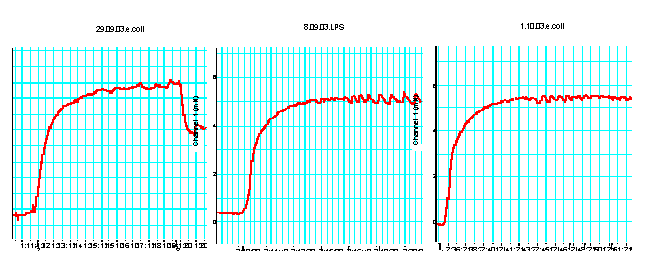| pA2 online © Copyright 2004 The British Pharmacological Society |
023P
GKT, University of London Winter Meeting December 2003 |
|
Effects
of Gram negative E.coli bacteria or LPS on vasomotor responses in
murine vessels |
|
Systemic Gram negative infections can progress to septic shock which is characterised by a profound and unresponsive (to pressor agents) decline in blood pressure. In animal models Gram negative Lipopolysaccharide (LPS) is known to induce a biphasic fall in blood pressure: The first phase is immediate and the second phase occurs after several hours (Thiemermann et al, 1990). The first phase, immediate, fall in blood pressure, is thought to be mediated by widespread activation of the endothelium which may occur in vitro (Salmerini et al, 1990). The effects of chronic (ie several hours) exposure of blood vessels to LPS on vasomotor responses in vitro are well studied and known to be associated with the induction of vasoactive genes. However, direct effects of LPS on vasomotor responses are not well studied. Here we have investigated the effects of LPS or whole, heat killed Escherichia Coli (E.coli) on vasomotor responses in a selection of murine vessels.
First division pulmonary arteries (PA), renal arteries (RA) and internal mammary arteries (IMA) from male mice (BL6; 25-31g) were mounted in a DMT 610M multi-chamber myograph. Vessels were equilibrated as described previously (Mulvany and Halpern, 1977). Vasodilation was measured in the pre-constricted (EC80 concentration of U46619) vessels. U46619 induced concentration related constrictions in each vessel tested. Similarly acetylcholine induced vasodilation in all vessels (Emax; PA, 38.4%±5.7, n=7; RA, 64.7%±7.4, n=7; IMA, 33.0%±8.5, n=5).

Figure 1: Representative trace showing vasodilator effects in murine PA induced by acetylcholine (10-5M). Effects of LPS (0.1, 1 or 10µg/ml) or E.Coli (3x107, 107 or 3x106 CFU/ml) are also shown.
Neither E.coli (106 CFU.ml-1; PA, 102.5% ±2.1, n=3; RA, 106.1%±6.9, n=3; IMA, 100.78%±10.0, n=3) nor LPS (10 µg.ml-1; PA, 107.4%±2.5, n=4; RA 96.7±2.6, n=4; IMA 98.6%±3.1, n=3) had any effect on murine vessels pre-constricted with U46619./
These observations clearly show that Gram negative bacteria do not induce immediate vasodilatation in isolated blood vessels. The mechanisms regulating acute hypotension in response to LPS remain to be elucidated.
Mulvany MJ et al,
(1977), J Physiol: 265: 21P-23P.
Thiemermann C et al, (1990) Eur J Pharmacol.;182:591-5.
Salvemini D et al, (1990) Proc. Natl. Acad. Sci. USA; 87:
2593-2597.
This work was funded by the Wellcome Trust.